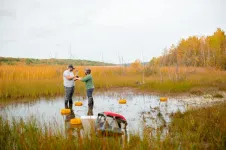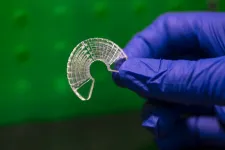COVID-19: Study from 116 countries suggests surgery should be delayed for at least seven weeks following a COVID-19 diagnosis to reduce mortality risk
More than 15,000 co-authors make this largest ever collaborative surgery study
2021-03-10
(Press-News.org) New international research published in Anaesthesia (a journal of the Association of Anaesthetists) concludes that surgery should be delayed for seven weeks after a patient tests positive for SARS-CoV-2, since the data show that surgery that takes place between 0 and 6 weeks after diagnosis is associated with increased mortality.
The study is by the COVIDSurg Collaborative: a global collaboration of over 15,000 surgeons working together to collect a range of data on the COVID-19 pandemic. This study's lead authors are Dr Dmitri Nepogodiev (Public Health) and Dr Aneel Bhangu (Surgeon) of the University of Birmingham, UK.
While it is known that infection with SARS-CoV-2 during surgery increases mortality and international guidelines recommend surgery should be delayed for patients testing positive for COVID-19, there is little evidence regarding the optimal duration of delay.
This international multicentre study included 140,231 patients (1,674 hospitals, 116 countries)* undergoing surgery in October 2020. Participating hospitals included all patients undergoing a surgical procedure. The number of co-authors (more than 15,000) makes this the largest collaborative surgery study ever undertaken globally.
Patients who became infected with SARS-CoV-2 after their surgery were excluded from the study. The primary outcome measure was 30-day postoperative death. Statistical modelling was used to adjust for patient, disease, and operation variables and calculate adjusted 30-day mortality rates for different time periods from SARS-CoV-2 diagnosis to surgery.
The time from SARS-CoV-2 diagnosis to surgery was 0-2 weeks in 1,144 (0.8%) patients, 3-4 weeks in 461 (0.3%), 5-6 weeks in 327 (0.2%), 7 weeks or more in 1,205 (0.9%), and 137,590 (97.8%) patients did not have SARS-CoV-2 infection. Adjusted 30-day mortality in patients who did not have SARS-CoV-2 infection was 1.5%. This was increased in patients operated at 0-2 weeks (4.0%), 3-4 weeks (4.0%), and at 5-6 weeks (3.6%), but not at 7-8 weeks (1.5%) after SARS-CoV-2 diagnosis.
These findings were consistent across age groups, patient fitness levels, urgency (elective versus emergency) of surgery, and grade (minor versus major) of surgery. Following a delay of 7 weeks or more, patients with ongoing COVID-19 symptoms (6.0%) had higher mortality than patients whose symptoms had resolved (2.4%) or who had been asymptomatic (1.3%).
Dr Dmitri Nepogodiev says: "We found that patients operated 0-6 weeks after SARS-CoV-2 infection diagnosis are at increased risk of postoperative death, as were patients with ongoing symptoms at the time of surgery. We recommend that whenever possible surgery should be delayed for at least 7 weeks after a positive SARS-CoV-2 test result, or until symptoms resolve if patients have ongoing symptoms for 7 weeks or more after diagnosis."
Dr Aneel Bhangu adds: "Decisions regarding delaying surgery should be tailored for each patient, since the possible advantages of delaying surgery for at least 7 weeks following SARS-CoV-2 diagnosis must be balanced against the potential risks of delay. For some urgent surgeries, for example for advanced tumours, surgeons and patients may decide that the risks of delay are not justified."
Dr Mike Nathanson, President of the Association of Anaesthetists, said "This paper provides important information to patients and their carers and will help them determine the right time for surgery after a COVID-19 infection. Of the millions of patients now waiting for surgery, many will have had COVID-19 and they will want to be informed about the risks. COVID-19 will be with us for many years and the number of patients with a previous infection will continue to increase."
INFORMATION:
ELSE PRESS RELEASES FROM THIS DATE:
2021-03-09
Over the summer and fall, paper after paper revealed that mothers are one of the demographics hardest hit by the pandemic. From layoffs and leaving careers to do caretaking, to submission rate decreases and additional service projects, the data were clear, but the follow up less so. Many of the problems are not new and will remain after the pandemic. But a new paper, published this week in PLOS Biology, outlines methods to help solve them.
"In the spirit of the well-worn adage 'never let a good crisis go to waste,' we propose using these unprecedented times as a springboard for necessary, substantive and lasting change," write the 13 co-authors, led by researchers from Boston University and hailing from seven institutions, ...
2021-03-09
Language difficulties and cultural barriers keep an "alarming" number of Chinese Americans from asking for cancer screenings that may protect their health, according to a new University of Central Florida study.
Su-I Hou, professor and interim chair of UCF's Health Management & Informatics Department, said her results show that physicians and members of the Chinese community need to improve their communication about the importance of cancer screenings. Her study was recently published in the Asian Pacific Journal of Cancer Prevention.
Hou surveyed 372 ...
2021-03-09
PHILADELPHIA (March 9, 20201) - The PhD degree prepares nurse scientists to advance knowledge through research that improves health, translates into policy, and enhances education. However, as the role of the nurse has changed, and health care has grown more complex, there is a need to re-envision how PhD programs can attract, retain, and create the nurse-scientists of the future and improve patient care.
To begin the dialog about the future of PhD education in research-intensive schools, the University of Pennsylvania School of Nursing (Penn Nursing) invited 41 educational, governmental, professional, and philanthropic institutions to ...
2021-03-09
MIAMI--In the Florida Straits at night, and under a new moon is the preference for spawning mahi-mahi, according to a new study by scientists at the University of Miami (UM) Rosenstiel School of Marine and Atmospheric Science.
These new details on the daily life of the highly sought-after migratory fish can help better manage their populations and provide scientists with new information to understand the impacts to the animal from changing environmental conditions.
To uncover these important details about the behaviors of mahi-mahi, or dolphinfish, the research team tagged captive spawning ...
2021-03-09
WOODS HOLE, Mass. -- A long-lasting, successful relationship between scientists at the MBL Ecosystems Center and the citizen-led Buzzards Bay Coalition has garnered a long-term record of water quality in the busy bay that lies west of Woods Hole. That record has already returned tremendous value and last week, it was published in Scientific Data, a Nature journal.
"We hope getting this data out will encourage scientists to use it to test new hypotheses and develop new insights into Bay health," said Rachel Jakuba, science director of the Buzzards Bay Coalition and lead author of the journal article.
Since 1992, a large and dedicated team of citizen volunteers, dubbed Baywatchers, has been ...
2021-03-09
News Release -- LOGAN, UT -- Mar. 9, 2021 -- Researchers at Utah State University are using silkworm silk to grow skeletal muscle cells, improving on traditional methods of cell culture and hopefully leading to better treatments for muscle atrophy.
When scientists are trying to understand disease and test treatments, they generally grow model cells on a flat plastic surface (think petri dish). But growing cells on a two-dimensional surface has its limitations, primarily because muscle tissue is three-dimensional. Thus, USU researchers developed a three-dimensional cell culture surface by growing cells on silk fibers that are wrapped around an acrylic ...
2021-03-09
COLUMBUS, Ohio - A new SARS-CoV-2 vaccine candidate, developed by giving a key protein's gene a ride into the body while encased in a measles vaccine, has been shown to produce a strong immune response and prevent SARS-CoV-2 infection and lung disease in multiple animal studies.
Scientists attribute the vaccine candidate's effectiveness to strategic production of the antigen to stimulate immunity: using a specific snippet of the coronavirus spike protein gene, and inserting it into a sweet spot in the measles vaccine genome to boost activation, or expression, of the gene that makes the protein.
Even with ...
2021-03-09
Delaying second doses of COVID-19 vaccines should reduce case numbers in the near term. But the longer-term case burden and the potential for evolution of viral "escape" from immunity will depend on the robustness of immune responses generated by natural infections and one or two vaccine doses, according to a Princeton University and McGill University study published March 9 in the journal Science.
"Several countries including the United Kingdom and Canada have stated that they will delay second doses of COVID-19 vaccines in response to supply shortages, but also in an attempt to rapidly increase the number of people immunized," said lead author Chadi Saad-Roy, a Ph.D. candidate in Princeton's Lewis-Sigler Institute for Integrative ...
2021-03-09
Members of the COVID-19 Primary Care Database Consortium explain how the use of big data containing millions of primary care medical records provides an opportunity for rapid research to help inform patient care and policy decisions during the COVID-19 pandemic. Established in April 2020, the Consortium brings together experts in big data, epidemiology, intensive care, primary care and statistics, as well as journal editors, patient and public representatives, and front-line clinical staff from the universities of Oxford, Cambridge, Southampton, Bristol and Nottingham
The consensus statement that the consortium has developed and described in the article aims to facilitate transparency and rigor in methodological approaches, as well as consistency in defining and reporting ...
2021-03-09
Members of the Perelman School of Medicine at the University of Pennsylvania and its health system developed and implemented a new model of collaborative care called The Penn Integrated Care (PIC) program. PIC includes a resource center to support intake, triage and referral management and collaborative care services in primary care practices. PIC was created to increase access to and engagement with mental health professionals to improve mental and physical health outcomes. Primary care physicians were able to refer patients with any mental health symptom or condition to PIC. In 12 months, 6,124 unique patients were referred from eight primary care clinics to either the PIC Resource Center or were connected with a mental health professional. ...
LAST 30 PRESS RELEASES:
[Press-News.org] COVID-19: Study from 116 countries suggests surgery should be delayed for at least seven weeks following a COVID-19 diagnosis to reduce mortality risk
More than 15,000 co-authors make this largest ever collaborative surgery study




